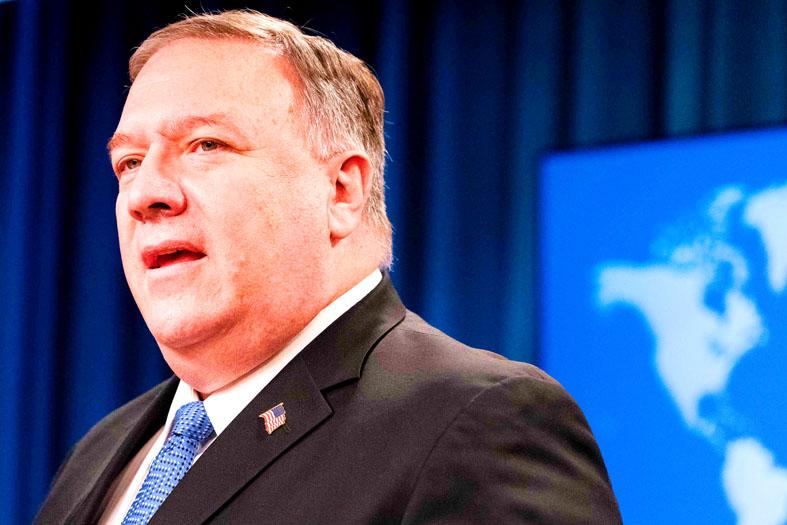The government yesterday welcomed a statement by US Secretary of State Mike Pompeo that “Taiwan has not been a part of China,” saying that the two sides of the Taiwan Strait should maintain the “status quo” based on equal dignity.
During a telephone interview with the Hugh Hewitt Show radio program aired on Thursday, Pompeo was asked to comment on the US’ commitments to Taiwan’s security and the opinions of radical elements of the Chinese Communist Party that Taiwan should be “retaken by force if necessary.”
In response, Pompeo said it was important to “get the language right.”

Photo: AFP
“Taiwan has not been a part of China, and that was recognized with the work that the [former US president Ronald] Reagan administration did to lay out the policies that the United States has adhered to now for three-and-a-half decades, and done so under both administrations,” he said, referring to Reagan’s “six assurances” made to Taipei in 1982.
“I actually think this is in fact bipartisan. I think the central understandings that this is a model for democracy that the people who live on Taiwan ought to be honored by having the Chinese live up to the commitments that they have made — I think this is something that both parties can agree to,” he said.
“You’ve seen our announcements with respect to weapon sales to Taiwan to assist in their defense capabilities. All of these things are designed to live up to the promises that have been made between, frankly, China and the Taiwanese people,” he added.
Pompeo also highlighted the importance of the Quadrilateral Security Dialogue among the US, Australia, India and Japan, saying that it would build a set of common understandings that deliver increased security in the region for travel and navigation.
In Taipei, Presidential Office spokesman Xavier Chang (張惇涵) said in a statement yesterday that it is an indisputable fact that the Republic of China is a sovereign state of 23 million Taiwanese who love freedom and democracy, and are glad to make contributions to the global community.
Both sides of the Strait should, based on the principle of equal dignity, jointly maintain the peaceful and stable “status quo” across the Strait, he said.
Taiwan would continue to fulfill its international obligations, making positive contributions to cross-strait and regional peace, stability and prosperity, he said.
“The Republic of China is a sovereign state, not part of the People’s Republic of China, which is a fact as well as the status quo,” Ministry of Foreign Affairs spokeswoman Joanne Ou (歐江安) said in a separate statement, thanking Pompeo for his support.
The Chinese Ministry of Foreign Affairs said that China would strike back against any moves that undermine its core interests.
Speaking in Beijing, Chinese Ministry of Foreign Affairs spokesman Wang Wenbin (汪文斌) said that Taiwan was an inalienable part of China and that Pompeo was further damaging US-China ties.
“We solemnly tell Pompeo and his ilk, that any behavior that undermines China’s core interests and interferes with China’s domestic affairs will be met with a resolute counterattack by China,” he said, without elaborating.
Additional reporting by Reuters

The Taiwanese passport ranked 33rd in a global listing of passports by convenience this month, rising three places from last month’s ranking, but matching its position in January last year. The Henley Passport Index, an international ranking of passports by the number of designations its holder can travel to without a visa, showed that the Taiwan passport enables holders to travel to 139 countries and territories without a visa. Singapore’s passport was ranked the most powerful with visa-free access to 192 destinations out of 227, according to the index published on Tuesday by UK-based migration investment consultancy firm Henley and Partners. Japan’s and

NATIONAL SECURITY THREAT: An official said that Guan Guan’s comments had gone beyond the threshold of free speech, as she advocated for the destruction of the ROC China-born media influencer Guan Guan’s (關關) residency permit has been revoked for repeatedly posting pro-China content that threatens national security, the National Immigration Agency said yesterday. Guan Guan has said many controversial things in her videos posted to Douyin (抖音), including “the red flag will soon be painted all over Taiwan” and “Taiwan is an inseparable part of China,” while expressing hope for expedited “reunification.” The agency received multiple reports alleging that Guan Guan had advocated for armed reunification last year. After investigating, the agency last month issued a notice requiring her to appear and account for her actions. Guan Guan appeared as required,

Japan and the Philippines yesterday signed a defense pact that would allow the tax-free provision of ammunition, fuel, food and other necessities when their forces stage joint training to boost deterrence against China’s growing aggression in the region and to bolster their preparation for natural disasters. Japan has faced increasing political, trade and security tensions with China, which was angered by Japanese Prime Minister Sanae Takaichi’s remark that a Chinese attack on Taiwan would be a survival-threatening situation for Japan, triggering a military response. Japan and the Philippines have also had separate territorial conflicts with Beijing in the East and South China

A strong cold air mass is expected to arrive tonight, bringing a change in weather and a drop in temperature, the Central Weather Administration (CWA) said. The coldest time would be early on Thursday morning, with temperatures in some areas dipping as low as 8°C, it said. Daytime highs yesterday were 22°C to 24°C in northern and eastern Taiwan, and about 25°C to 28°C in the central and southern regions, it said. However, nighttime lows would dip to about 15°C to 16°C in central and northern Taiwan as well as the northeast, and 17°C to 19°C elsewhere, it said. Tropical Storm Nokaen, currently